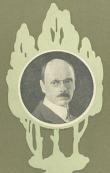Opera.
Adapted by Rudolf Lothar from his own play, King Harlequin was given its world premiere in Berlin, Germany under the title König Harlekin. The little that Australians new about this opera during the early 1910s came from a Sydney Morning Herald column, "Music and Drama" (21 December 1912) which published comments forwarded to its office by ex-Sydney resident Viola Agnew (then living in Europe). Her correspondence also includes extracts published in several Berlin newspapers. According to one critic the opera is 'a riddling satire,' which explores the 'blind acceptance of an impostor as a blue-blooded monarch.' In this regard 'King Harlequin exposes the hollow nature of all worldly status and countenances the wildest democracy.'
The libretto, described as having been written in the romantic opera tradition of The Prisoner of Zenda, deals with the friendship between a witty court jester, Harlequin, who is in love with the maiden Columbine, and Bohemund, next in line to the throne of Lusitania, who strangely resemble each other. Upon the death of the king, and amidst the crisis of state that is caused, Harlequin discovers that his friend is also in love with Columbine. They fight, and Harlequin accidentally kills Bohemund. To save himself, he assumes the role of the Prince, and informs the court that he has killed the jester in a quarrel. His deception is aided by the fact that the queen is both blind and grief-stricken. Columbine, too, is grief-stricken, as she was also in love with Harlequin, and now believes him dead at the hands of the new king. The opera ends when the new, inexperienced, court jester fails to entertain the court in the proper manner. The impostor King shows him how it should be done, to the astonishment of the court. Only Columbine recognises the truth, however. Harlequin thus philosophises: 'Over all things exist ends and boundaries, only in love not. When man for love dies, begins man first to live' (p4).
With regard to the music, Miss Agnew writes : 'A great sensation has been caused in English musical circles by the remarkable success accorded to Mr George Clutsam... on the performance of his opera King Harlequin... The German critics have metaphorically shaken Mr Clutsam by the hand. The Tageblatt, for example, comments on "the fine instrumentation, the musical adaptation of sound with event [and] the whole agile adjustment." Another critic, writing for the Berliner Zeitung, is quoted as having said : "Mr Clutsam's intimate study of Puccini, Strauss and Debussy have molded his work... it is piquant, yet classical and withal original... The cynical force permeating the whole work of [librettist] Lothar finds an echo in the strength and virility of the composer"' (p.4).
Not surprisingly, New Zealand accorded Clutsam's achievement more coverage. The Press newspaper, for example, published an article on the opera in December 1912. In it the paper's London Correspondent provides a synopsis of the libretto and some background on the creation of the work, as well as some responses by the Berlin music critics:
New Zealand will, indeed, be unworthy of her sons if she fails to do honour to Mr George H. Clutsam, whose achievement in Berlin is something of an international musical event. After numerous postponements Mr Clutsam's opera King Harlequin, was produced at the handsome new Kurfursten Opera House in Berlin on Friday night, and to the Aucklander belongs the distinction of being the first British composer to have a serious opera produced for the first time in the German capital for many years. Great credit is due to the Director of the Kurfurstcn, Herr Palfly, for his courage, for musical Germany - and particularly musical Berlin - is inclined to guard its frontiers somewhat jealously. Berlin is apt to look coldly on opera from abroad, especially from England, so that the cordial reception given to the composer at the close - he was called three times before the curtain - may be regarded as an unusual compliment to the merits of the production ("New Zealander's Triumph," p.10).
Interestingly, although the opera was well-received by the German critics, King Harlequin has never been performed in Britain. No performances have yet been located in New Zealand or Australia either.
 6743243041001676361.jpg
6743243041001676361.jpg